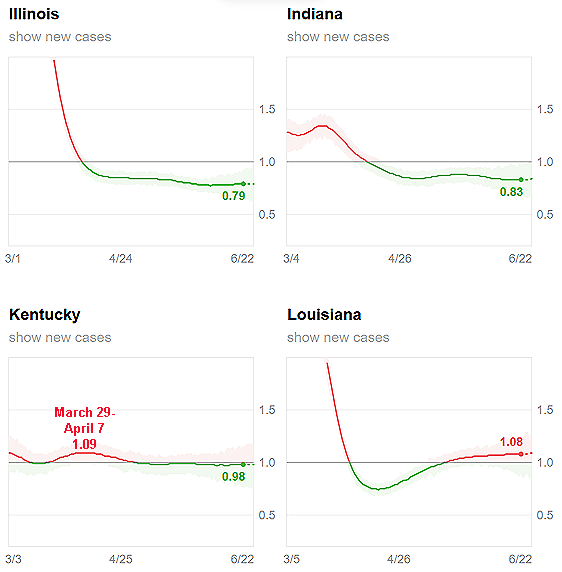Covid-19 update: Estimated coronavirus transmission rate in Kentucky stable at safe level; state’s rate is 30th highest in nation

Estimates of coronavirus transmission rates by the RT.live website illustrate Kentucky’s differences with two bordering states to the north and one of the states in the South, where cases and estimated rates are rising. A 1.09 rate means 100 infected people will infect another 109 people, who will each infect 109 more, and so on. A rate below 1 means the virus will eventually stop spreading, over a long period of time. Ohio’s estimated statewide rate is 0.96; it and Kentucky rank 29th and 30th in the nation, respectively. West Virginia’s is 1.05; Tennessee’s is 1.06.
—–
In other covid-19 news Tuesday:
- “In what could represent the leading edge of a wave of litigation,” families of two patients killed by covid-19 and a third who suffered from it for weeks are suing the owner of their Columbia nursing home that was hit hard by it. The suit in Adair Circuit Court alleges that Signature HealthCare failed in its duty to provide adequate care and protect residents,” the Lexington Herald-Leader reports. “Fifteen residents and two employees have died at Summit Manor after contracting the coronavirus,” and 96 have tested positive for the coronavirus. “The suit also represents one Summit Manor resident . . . who was hospitalized March 30 for kidney failure and blood clots but who did not test positive for covid-19,” the newspaper reports. The plaintiffs’ attorney, Derrick Helm, “said Crosby’s case reflects neglect by the nursing home.
- Helm said he wasn’t aware of other covid-related litigation pending against Kentucky nursing homes, but he expects to see more soon.” They will likely “have to clear the hurdle of arbitration,” reporters John Cheves and Bill Estep write. “It has become common for nursing homes to ask people to sign arbitration agreements during the admissions process. Later, if the resident or their families want to sue, the nursing home instead can insist that the dispute be resolved outside of the courtroom by a professional arbitrator, who is less likely to award the sort of large damages sometimes handed down by juries.
- President Trump, asked if he had directed his administration to slow coronavirus testing, said said he wasn’t joking when he said that during his rally in Tulsa on Saturday. “I don’t kid,” he told reporters. Soon afterward, in testimony to a House committee, the nation’s top infectious-disease expert, Dr. Anthony Fauci, said, “None of us have ever been told to slow down on testing. … In fact, we will be doing more testing.” Other administration officials said likewise.
- In response to a question from Rep. Brett Guthrie, R-Bowling Green, Fauci said some counties “may have such a low level of infection that schools can open in a way that is exactly like normal . . . You want to tailor it to the degree of viral dynamics in the particular location. Guthrie said that means “We have to get closer to that point before we make those decisions.”
- Robert Redfield, director of the Centers for Disease Control and Prevention, told the committee that tracing the contacts of infected people and getting them to self-isolate will be “critical” as schools open, and the CDC will issue guidance for them soon.
- Fauci said several states are seeing a “disturbing surge” of cases, and then next two weeks “are going to be critical in our ability to address those surges.” He said the surges “were largely attributable to an increase in community transmission . . . contrary to statements from President Trump and Vice President Pence that the recent increase in infections was largely due to an increase in testing,” The Washington Post reports. “In his opening statement, Fauci [said] he was ‘cautiously optimistic’ that an effective vaccine will be available to the American public by the end of this year or the beginning of next year.”